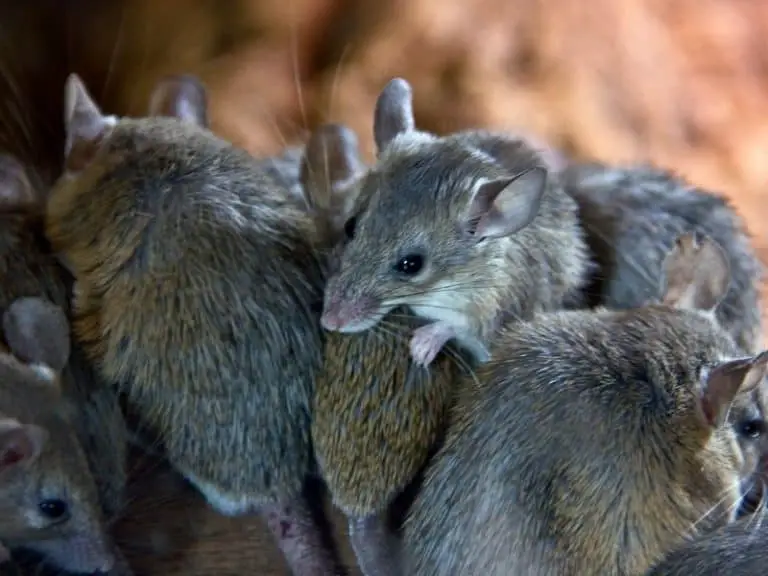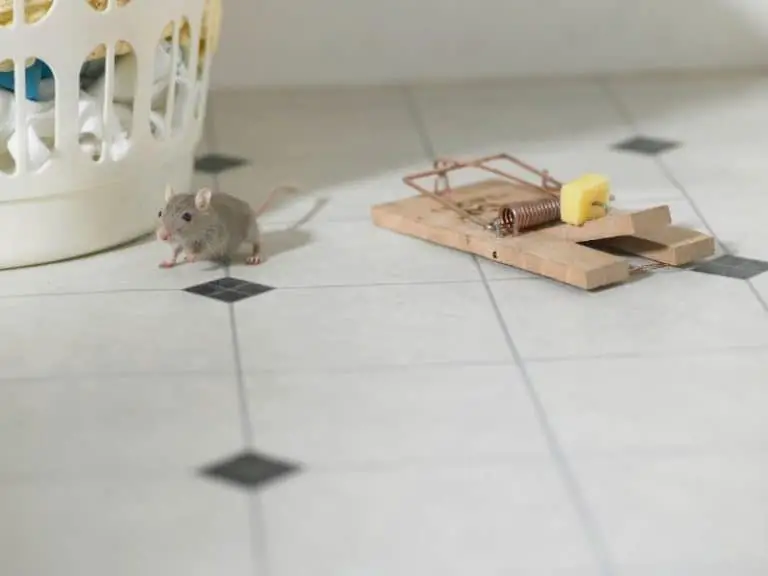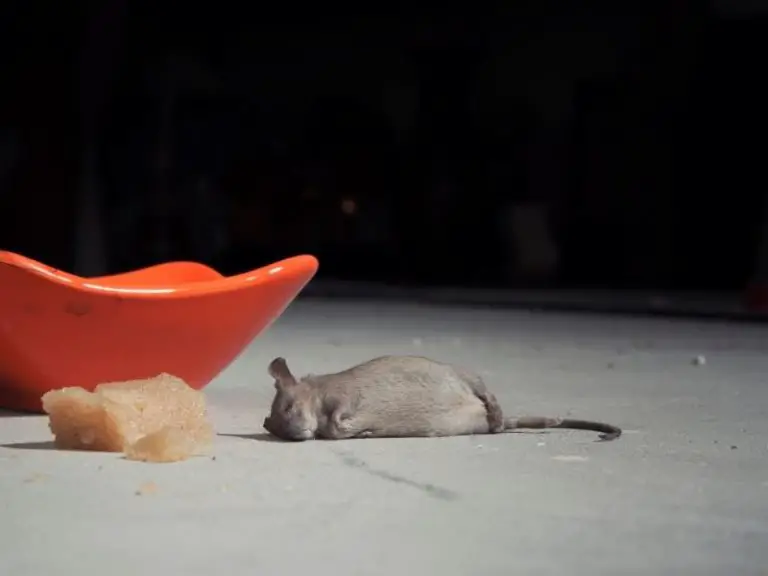Can The Smell Of A Dead Mouse Be Harmful To Your Health
Mice aren’t just a problem when they are alive. They become an even bigger nuisance when they die in their nesting or hiding areas or in places that are difficult to reach inside your home.
The smell is usually disgusting and sickening. That’s why some people are concerned whether they can get sick after smelling a rotten body of a mouse hidden behind the wall.
While mice can transmit diseases such as hantavirus to humans, the smell of dead mice does not contain harmful bacteria, so the odor will not make one sick. On the other hand, the dead mouse carcass can be a breeding ground for flies that carry diseases harmful to one’s health.
Pro-tip: Do you know that there is a better way to catch mice than traditional mousetraps that kill mice? Check out the humane mousetraps on Amazon.com now.
Diseases That Mice Transmit To Humans
The smell of dead mice is a mixture of methane, sulfur dioxides, benzene derivatives, and long-chain hydrocarbons.
This is because the tissues of the dead mice are already decomposing. This smell is not particular to mice because this is how most dead rodents smell like.
Hantavirus
This disease can be transmitted by the deer mouse, the white-footed mouse, the rice rats, and the cotton rat. It is still best to void all kinds of mice and rats to prevent the possibility of contracting this disease.
People can get sick with Hantavirus if they inhale the Hantaviruses. This takes place when an infected mouse’s droppings or urine get stirred up into the air.
People can likewise contract the disease by touching the infected mouse’s droppings, urine, or nesting materials, then the person will touch their eyes, nose, or mouth after the contact.
Hantavirus symptoms include severe muscle aches, fever, fatigue, and even difficulty breathing. It could also cause headaches, nausea, chills, stomach pain, diarrhea, and vomiting.
The sickness can last for one to five weeks. It could even progress to Hantavirus Pulmonary Syndrome. This is a severe respiratory disease that can lead to death.
Lymphocytic Choriomeningitis
The primary host of this disease is the house mouse. The transmission of this disease would be through exposure to fresh urine, droppings, saliva, or contact with the infected mouse’s nesting material.
If the mouse that just died in your home is the carrier of this disease, there is a good chance you touched the urine, dropping, saliva, and nesting materials of the mouse when you try to dispose of their carcass. Another way of transmission is through the bite of the infected mouse.
There are two phases of Lymphocytic Choriomeningitis.
The first one is the flu-like phase. One may experience fever, lack of appetite, muscle aches, headache, vomiting, and nausea.
The second phase is the neurologic disease. It could include meningitis, which causes fever and headache; encephalitis, which causes confusion, drowsiness, sensory disturbances, and even paralysis; or meningoencephalitis, which causes inflammation of the brain and the meninges.
If the second phase is experienced, one may require medical attention and be admitted to the hospital. Also, it could cause temporary or neurological damage to the person infected.
Diseases Transmitted by Flies
The decaying body of a mouse that is not properly or immediately disposed of can become the flies’ breeding ground. The flies then give birth to maggots, and these could spread like wildfire inside your home.
The parasites will be searching for a new living host, and your family is most likely at risk.
How Long Does The Smell Of Dead Mouse Last
You should know that the putrid smell would get stronger each day, so it is best to have the dead body of the mouse removed from your home. Dead mice smell would only go away after the body is fully decomposed or dried out.
The problem, however, is if the mouse dies in an area where it is damp. The damper the site, the longer would the foul odor be smelled by you. If the mouse also dies near a stamp pipe, you could have the problem of foul odor for weeks.
How To You Locate The Area Where The Mouse Died
Use Your Nose
This may be too obvious, but you should use your nose to look for the place where the mouse died.
Although the foul order from the dead mouse would probably stink up a larger area, you can use your mouse to detect which place has the strongest smell.
Keep An Eye Out For Nesting Or Hiding Areas
Another way is to look for the nesting or hiding area of the mouse. If you used poison to kill the mouse, the poison might take hours or even days to take effect. Hence, the mouse could have made its way back to its nest or at least to a place where it can lie down.
To find their nest or hiding places, you can check for mouse droppings. This is the number one sign that a mouse has built its nest. The more mouse droppings, the closer you are to the nest or hiding area.
Another thing to look out for is cardboard, paper, or fabric shreds. Mice want to make their nesting or hiding area comfortable and snuggly, so they use these soft items.
If you cannot find the nesting or hiding area, the other places you should look into are the attic, the loft cavity, the basement, the walls, or places in your home that do not have a lot of human activity or foot traffic.
Spot Flies Or Maggots
Two of the common insects that feast on the dead bodies of an animal are mice and maggots. If you see an area where flies gather or where maggots are migrating away from, that’s most likely where the dead body of the mouse is.
Check Damp Spots
If you find a damp spot in your wall or on your ceiling and you are positive, the foul odor also emanates from it, that’s probably where the dead mouse is.
Recruit Another Animal To Help
If you have a pet at home, you should observe it. This is because animals can detect the smell earlier than humans can. So if your pet is acting strangely towards an area, you should immediately check it out.
Cleaning a Mouse Nest
Once you locate the nesting or hiding are of the mouse or where it died, you need to clean it out not just to remove the smell of the dead mouse but also to remove the possible pathogens the carcass left behind.
First, you have to wear rubber or plastic gloves to avoid being contaminated by any disease in case the dead mouse was a carrier of a virus or bacteria.
Next, you should spray the area and the surrounding areas with a disinfectant. If you do not have any disinfectant, you can make bleach and water solution because it also makes for a good disinfectant. Let the disinfectant spray or solution set for several minutes to make sure it would disinfect the area.
If you found the mouse in a trap or its nesting area, be sure to place the nesting materials and the trap, as well as the dead mouse, in a sealed plastic bag. Place the first bag in another plastic bag and seal it once again.
After cleaning and disposing of the dead mouse, you should clean your gloves by soaking it in the bleach and water solution or use a disinfecting spray.
You should also shower immediately and wash your clothes to get rid of possible mouse germs.
Photo credit: ©canva.com/fastfun23
Medical Disclaimer: TheHomePestControl is a digital publisher and does not offer personal health or medical advice. The contents of this website are not intended to substitute for professional medical advice, diagnosis, or treatment.
Affiliate Disclaimer: As an Amazon Associate, I earn from qualifying purchases made on our website. If you make a purchase through links from this website, I may earn a commission at no additional cost to you.






